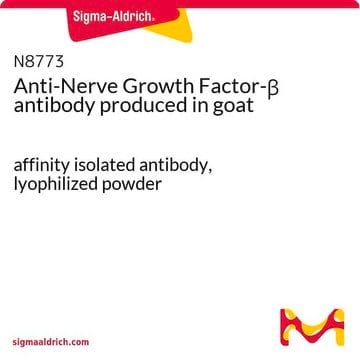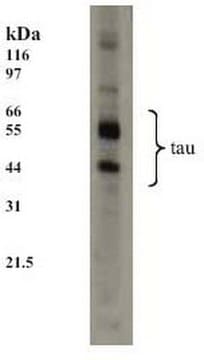N5788
Anti-Nerve Growth Factor Receptor/TNFRSF16 antibody produced in goat
affinity isolated antibody, lyophilized powder
Sinónimos:
Anti-LNGFR, Anti-Ngfr, Anti-Tnfrsf16, Anti-p75
About This Item
Productos recomendados
biological source
goat
Quality Level
conjugate
unconjugated
antibody form
affinity isolated antibody
antibody product type
primary antibodies
clone
polyclonal
form
lyophilized powder
species reactivity
mouse
technique(s)
immunohistochemistry: 5-15 μg/mL
western blot: 2 μg/mL
UniProt accession no.
storage temp.
−20°C
target post-translational modification
unmodified
Gene Information
mouse ... Ngfr(18053)
¿Está buscando productos similares? Visita Guía de comparación de productos
Categorías relacionadas
General description
Anti-Nerve Growth Factor Receptor/TNFRSF16 recognizes mouse NGF R.
Immunogen
Application
Target description
Physical form
Disclaimer
¿No encuentra el producto adecuado?
Pruebe nuestro Herramienta de selección de productos.
related product
Storage Class
13 - Non Combustible Solids
wgk_germany
WGK 1
flash_point_f
Not applicable
flash_point_c
Not applicable
ppe
Eyeshields, Gloves, type N95 (US)
Elija entre una de las versiones más recientes:
¿Ya tiene este producto?
Encuentre la documentación para los productos que ha comprado recientemente en la Biblioteca de documentos.
Nuestro equipo de científicos tiene experiencia en todas las áreas de investigación: Ciencias de la vida, Ciencia de los materiales, Síntesis química, Cromatografía, Analítica y muchas otras.
Póngase en contacto con el Servicio técnico






